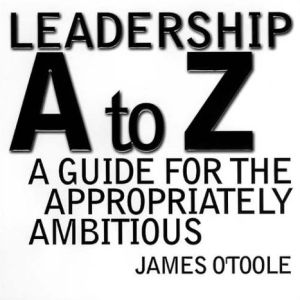Join getAbstract to access the summary!

Join getAbstract to access the summary!
James O Toole
Leadership A to Z
A Guide for the Appropriately Ambitious
Jossey-Bass, 1999
What's inside?
A lexicon of leadership, in which all characteristics and challenges matter, but ambition matters the most.
Recommendation
This simple but effective book is written for a general audience with interest in managerial, supervisory and leadership concepts. The book is structured as a dictionary of terms relating to leadership. While some readers may like the A-B-C division of information, others may find the book somewhat disjointed, as the format forces you to skip around from idea to idea. But then, as author James O’Toole points out, readers are invited to seek the nuggets that appeal to them, letter by letter. The connective tissue that O’Toole lays between the entries is ambition, which he says is the single pre-requisite to leadership and the one common characteristic that all great leaders share. getAbstract recommends this accessible summary of basic leadership principles, although hardcore readers of leadership literature might be better off elsewhere.
Summary
About the Author
James O’Toole is a Research Professor in the Center for Effective Organizations at the University of California and Chairman of the Board of Academic Advisors to Booz-Allen and Hamilton’s Strategic Leadership Center. He is the author of Leading Change.
















Comment on this summary